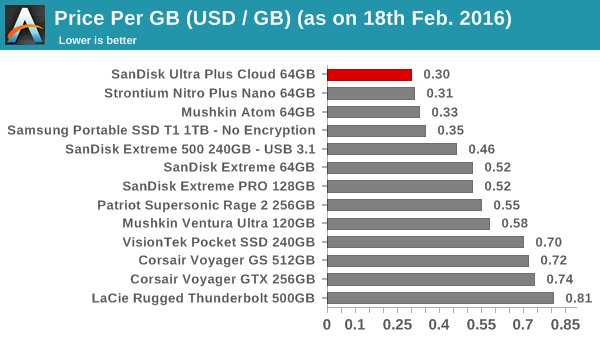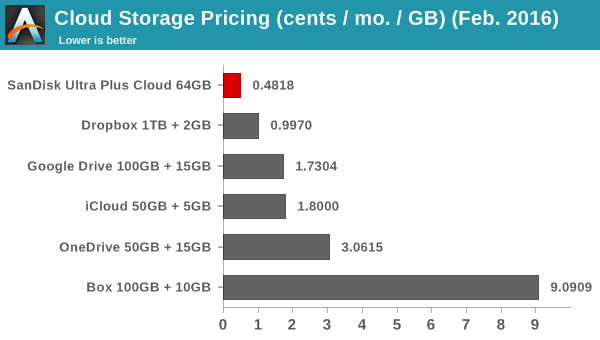SanDisk Ultra +Cloud 64GB + 64GB Flash Drive Review
by Ganesh T S on February 18, 2016 7:30 AM EST- Posted in
- Storage
- USB 3.0
- Flash Drive
- SanDisk
- Cloud Storage
Value Proposition and Concluding Remarks
Coming to the business end of the review, one can say that the Ultra +Cloud product from SanDisk is definitely unique in the market. In order to determine the value proposition, one should not simply look at the $30 price tag for the product. The non-cloud version of the product (the SanDisk Ultra USB 3.0 drive) is currently available for $18.80. The cloud version (SanDisk Ultra +Cloud) reviewed today retails for $30 - this translates to the cloud service costing $11.20 for 64GB for 3 years. The value proposition can be determined by comparing the price per GB for the flash drive alone along with the price per GB per month for the cloud storage plan.

The SanDisk Ultra 64GB easily wins the price per GB numbers. However, one must note that the unit has abysmal write transfer rates. Read performance is quite good though. Consumers must not blindly go with the price per GB graph above when taking a decision on a suitable flash drive to purchase.
The cloud service pricing comparison aspect is a bit more difficult to address. Different services have different base amounts and service agreement periods (monthly / yearly etc.). Most vendors start off with a free tier and any purchased plan adds on to the free tier storage amount. However, some vendors like Microsoft have really attractive pricing for their OneDrive offering when it is tagged along with a Office 365 subscription. Amazon's CloudDrive, for instance, has unlimited photo storage even in their basic 5GB plan. In the graph below, we have a comparison of the price per GB per month for various cloud services. Each graph entry shows the paid storage amount and the free storage amount whenever applicable. Given the strange structure of Amazon's CloudDrive pricing, we did not include it in the graph below. The OneDrive pricing considered for the graph below does not include the Office 365 subscription plan.

Bitcasa's cloud storage platform in the SanDisk +Cloud product seems to be the most economical of all the considered vendors. Obviously, each of these vendors have their own value additions in order to command the premium. The SanDisk +Cloud / Bitcasa platform is probably the most basic of all when it comes to features. However, the functionality offered is more than enough for the average consumer, in our opinion. Hence, the value proposition of the SanDisk Ultra +Cloud 64GB + 64GB unit is very good.
Depending on the reception for the product in the market, it is likely that SanDisk might want cloud options attached to other consumer products in their portfolio. We have to say that introducing this concept in a product priced at $30 is a good idea. Our experience with the cloud storage service was very positive overall. The cloud storage space can also be expanded by the consumer at a later time, if necessary. On the other side, consumers adopting this product will have to put up with disappointing performance, particularly for writes to the flash drive. Obviously, the argument that one should not complain about performance numbers for a sub-$20 flash drive does exist. Consumers should also keep in mind that the cloud storage service is valid only for 3 years, with no guaranteed renewal pricing.










21 Comments
View All Comments
Murloc - Thursday, February 18, 2016 - link
meh it may work as a marketing trick, but for most people it's best to buy separate I think.nospecialname - Thursday, February 18, 2016 - link
My thoughts exactly... Having 128 GB on the package is a bit like bundling a mountain bike with a station wagon and then marketing it as an all-terrain vehicle.masontula - Monday, July 25, 2016 - link
yes I agree with your thought, Let see, how to go further part and its Southampton.www.menslifeline.com
jabber - Thursday, February 18, 2016 - link
Always had an odd issue with high-end Sandisk USB3 sticks. I can plug them in and nothing...no detection. Plug in a Lexar/Toshiba/Samsung/Corsair/Kingston etc. USB3 stick the same way and it will detect every time. Can use any USB3 port, same story. To get the Sandisk's to connect I have to pull them out and jam them in hard (ahem) a couple of times...then they might detect. Then of course they have errors and need a scan. I now keep away from them. I've tried one of each generation of the Extreme/Ultras to see if it has changed but never has. (Shrugs)damianrobertjones - Thursday, February 18, 2016 - link
You must own a LOT of drives.Edgar - Thursday, February 18, 2016 - link
Should be due to bad luck i guess... my Sandisk Extreme is awesome... no issue so far after 1 year...zodiacfml - Friday, February 19, 2016 - link
Are you sure? It must have been Windows installing the driver for the Sandisk which you thought is no detection.Arbie - Thursday, February 18, 2016 - link
A really cheap marketing trick. Sandisk should be ashamed. Techniques like this debase the common terminology and create yet another landmine for the consumer.I recall a tape drive maker that advertised their capacity as "250MB". After you got the drive, you discovered that this meant "of compressed data"... so if you were storing MP3s or JPGs, it was only 125MB.
In any case, there's no way that Sandisk should be printing "128GB" right on the chip icon. They *know* some people will be mislead. And if they will knowingly mislead on this, what else will they do? This really degrades my opinion of a company I have formerly respected.
Teknobug - Thursday, February 18, 2016 - link
64GB+64GB cloud? Piss on Sandisk.lexluthermiester - Thursday, March 10, 2016 - link
Right? Cloud storage is just not useful to most users... And printing "128GB" on an SD card that only has 64GB of actual on-device-storage is misleading at best and a blatant rip-off at worst.